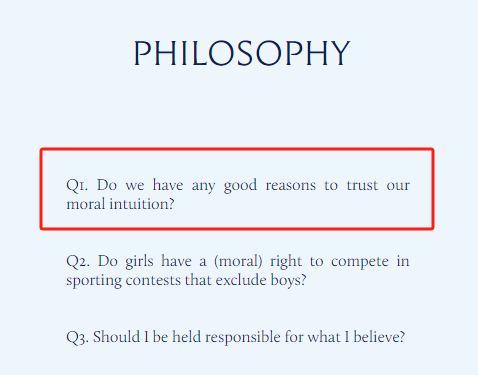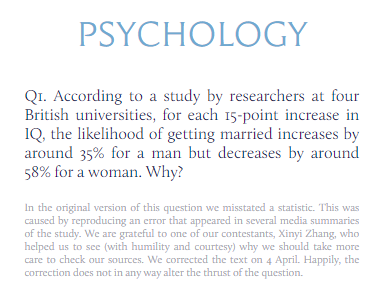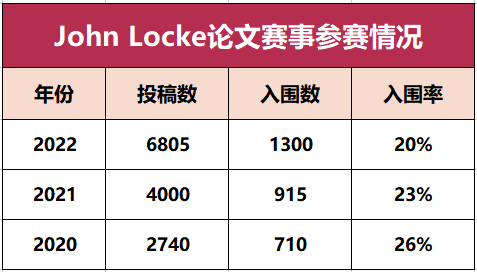John Locke写作竞赛是由位于英国牛津的独立教育组织John Locke Institute主办,联合牛津大学、普林斯顿大学、布朗大学、白金汉大学等名校教授共同组织的一项学术项目。该竞赛因其权威的主办方背景和专业严谨的学术要求,深受全球学子的青睐。2024年John Locke注册报名即将关闭,今天带大家一起了解一下John Locke写作竞赛七大领域的破题思路!
哲学 Philosophy
Q1: Do we have any good reasons to trust our moral intuition?
- 内在的道德判断和感觉:探讨道德直觉如何在我们的日常生活中发挥作用,以及它们是否可靠。
- 案例和实证研究:通过具体案例和科学研究来验证道德直觉的可信度。
Q2: Do girls have a (moral) right to compete in sporting contests that exclude boys?
- 性别平等:分析性别平等在体育竞赛中的体现。
- 权利分配:讨论在性别分隔的比赛中,女孩的参赛权利。
- 跨性别者权益:探讨跨性别者在这种竞赛中的权利和挑战。
政治 Politics
Q1: Is there such a thing as too much democracy?
- 自由民主:定义什么是“过多”的民主,探讨其可能的负面影响。
- 相关因素的互相制衡:如何通过制度设计来平衡民主的优缺点。
Q2: Is peace in the West Bank and the Gaza Strip possible?
- 巴以冲突:深入分析巴以冲突的历史和现状。
- 国际关系理论:利用国际关系理论来探讨解决冲突的可能性。
经济 Economics
Q1: What is the optimal global population?
-人口理论:研究不同的人口理论及其对于全球人口最优数的看法。
- 人口模型:使用人口模型来预测和分析最优人口的影响。
Q2: Accurate news reporting is a public good. Does it follow that news agencies should be funded from taxation?
- 新闻自由和独立性:讨论新闻自由与政府资助之间的关系。
- 政府对于新闻的资助:分析政府资助新闻机构的利与弊。
历史 History
Q1: Why was sustained economic growth so rare before the later 18th century and why did this change?
- 对于经济增长的衡量:探讨经济增长的历史衡量标准。
- “创新性破坏”的定义和局限性:分析“创新性破坏”在经济增长中的作用及其局限性。
Q2: Has music ever significantly changed the course of history?
- 音乐对历史的影响:探讨音乐在不同历史时期的影响。
- 当代音乐对社会和文化的影响:分析现代音乐如何塑造社会和文化。
法律 Law
Q1: When, if ever, should a company be permitted to refuse to do business with a person because of that person’s public statements?
- 反歧视法:探讨相关法律如何处理这种情况。
- 回归法条:具体法条的分析及其在实际案例中的应用。
Q2: In the last five years British police have arrested several thousand people for things they posted on social media. Is the UK becoming a police state?
- 国家控制和个人言论自由权之间的平衡:分析国家安全与个人自由之间的界限。
- 国际标准:比较其他国家的做法和国际标准。
心理 Psychology
Q1: According to a study by researchers at four British universities, for each 15-point increase in IQ, the likelihood of getting married increases by around 35% for a man but decreases by around 58% for a woman. Why?
- 进化心理学:从进化心理学的角度解释这一现象。
- 亲密关系:探讨智商与婚姻关系之间的复杂联系。
Q2: There is an unprecedented epidemic of depression and anxiety among young people. Can we fix this? How?
- 抑郁症和焦虑症产生的原因:分析年轻人中抑郁症和焦虑症的原因。
- 治疗抑郁症和焦虑症的方法:探讨可能的解决方案和治疗方法。
神学 Theology
Q1: “I am not religious, but I am spiritual.” What could the speaker mean by “spiritual”?
- 宗教本质:探讨“精神性”与“宗教性”的区别。
- 泛神论:分析泛神论在现代社会中的应用。
Q2: Is it reasonable to thank God for protection from some natural harm if He is responsible for causing the harm?
- 神的特质:探讨神学中的神性及其特质。
- 宿命论:分析宿命论与宗教信仰之间的关系。
还是没有思绪?还是不知如何破题?
今天为准备参加John Locke竞赛的同学准备了历年获奖论文,没有思路就去看范文,先知道怎么写才能拿奖,再来构思自己选题的内容!
扫码免费领取John Locke 七大组别历年获奖论文合集+推荐书单
咨询报名注意事项+预约试听体验课


扫码了解John Locke 备赛辅导+一对一文稿润色!















